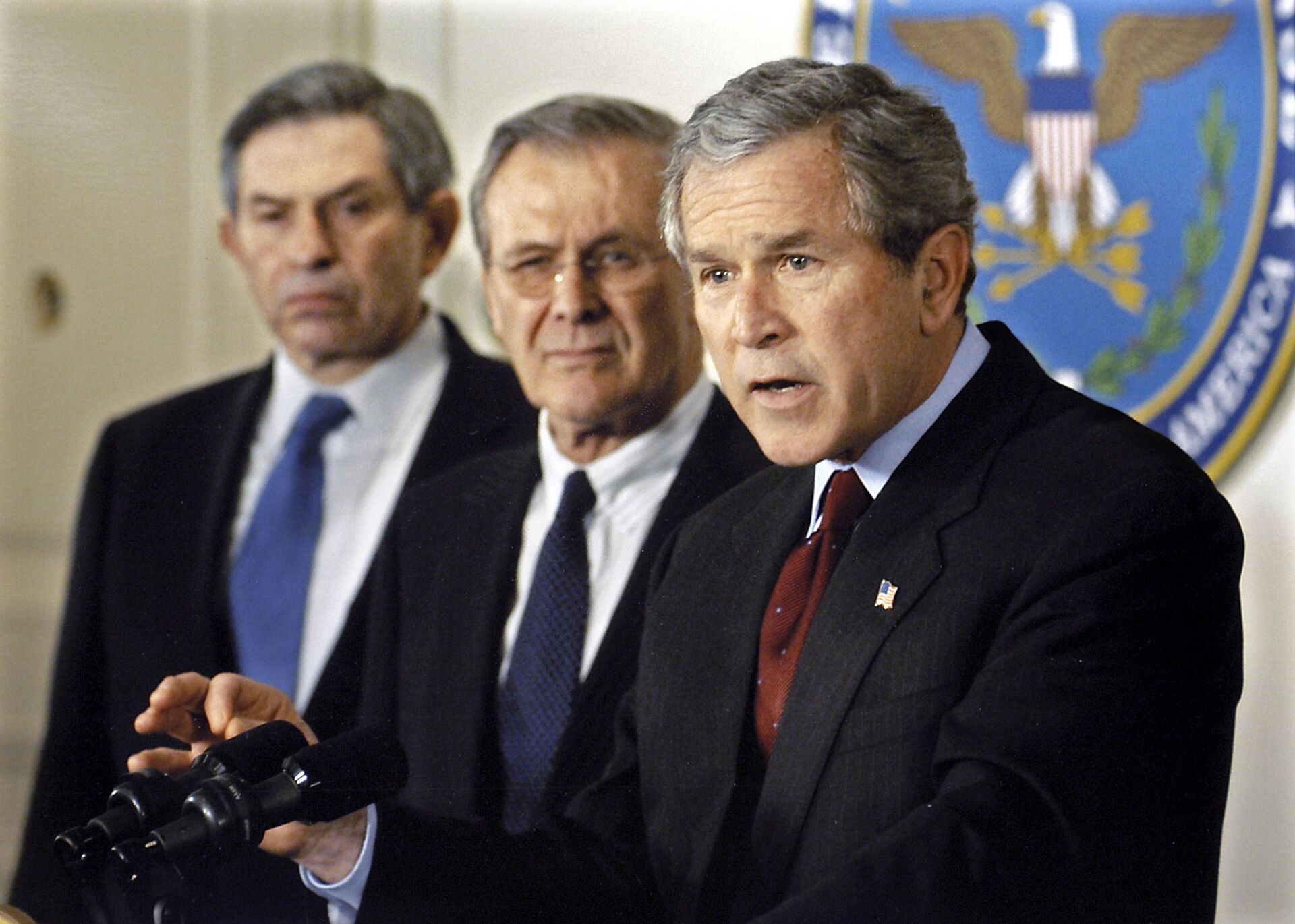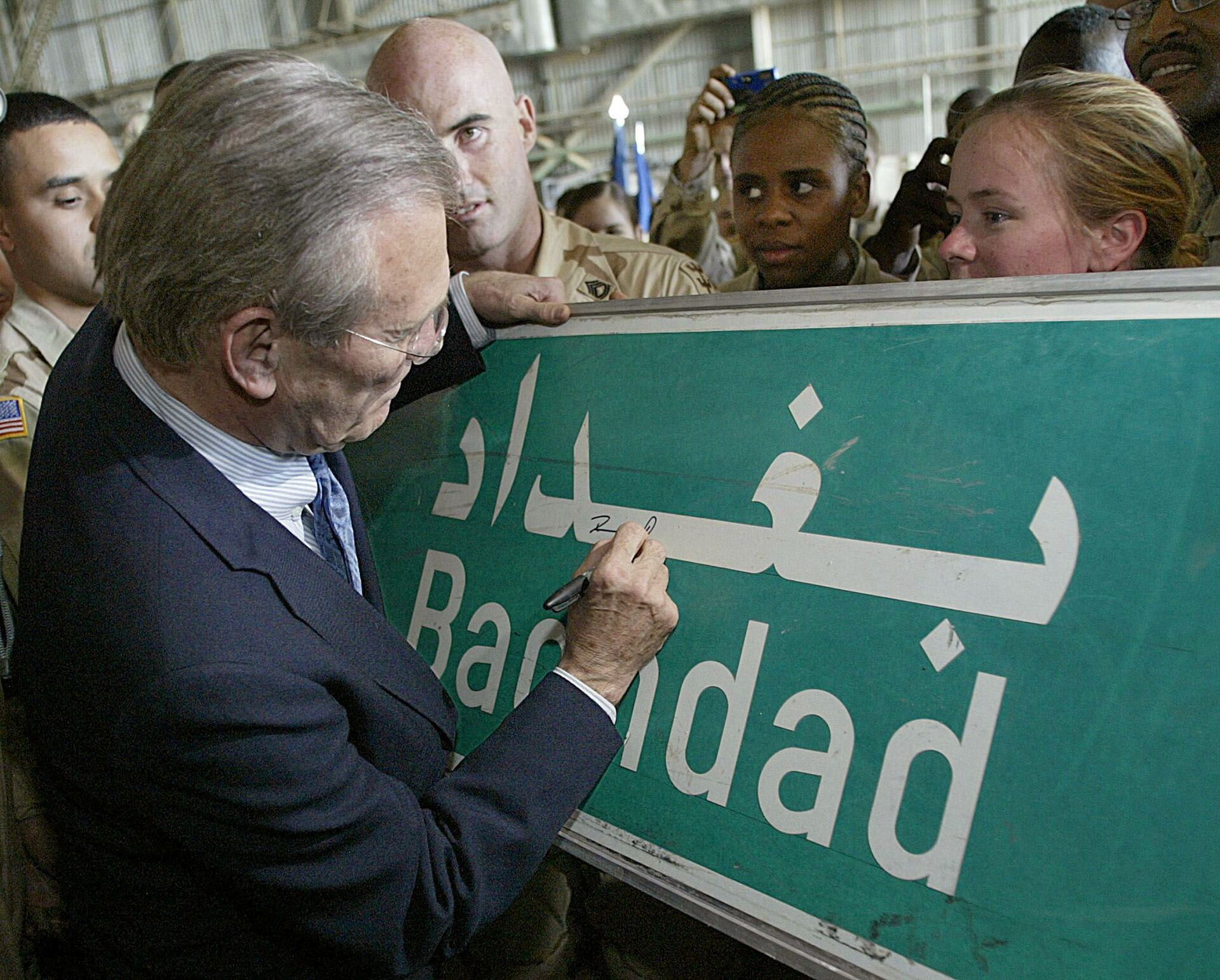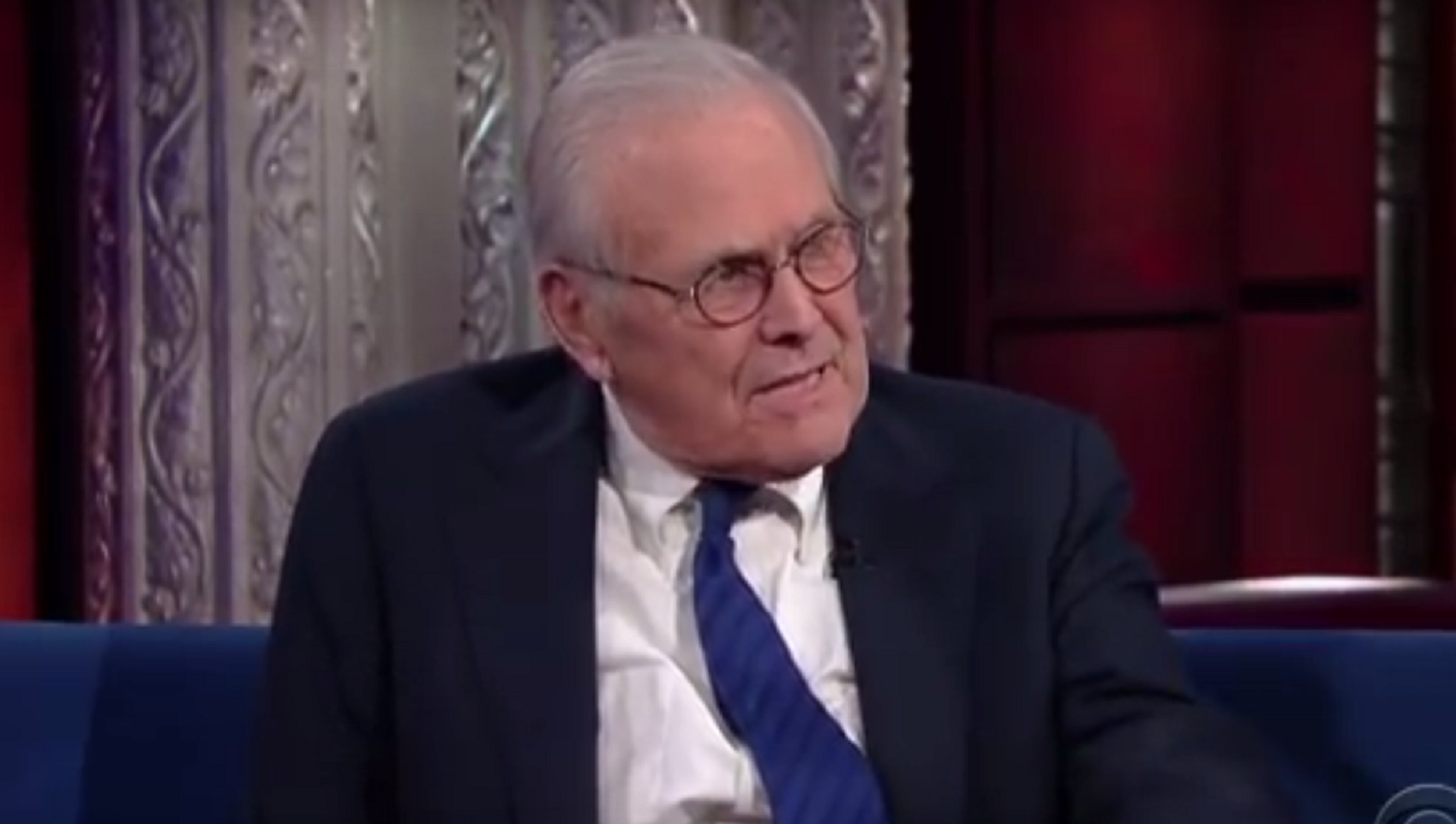‘Freedom is Untidy’: Remembering The Late Donald Rumsfeld, Dead at 88
Subscribe
Donald Rumsfeld’s family announced on Wednesday that he had died from multiple myeloma, a type of blood cancer. Rumsfeld, 88, had been retired from politics for several years, but in his time was a titular figure on the world stage. Sputnik takes a look back at some of the major points in Rumsfeld’s political career, which spans six decades.
Rumsfeld was born in Chicago, Illinois, on July 9, 1932. His family were German immigrants, and he attended a Congregational church. He graduated from New Trier High School and Princeton University, where he was an accomplished wrestler and majored in politics. He was also part of the Navy Reserve Officer Training Corps, and served as a naval aviator and flight instructor from 1954 until 1957 before shifting to the naval reserve, where he remained until 1989 when he retired at the rank of captain.
He began his political career as an administrative assistant to an Ohio lawmaker in Washington in 1957, but won office for himself as a Republican in 1962, representing Illinois’ 13th congressional district from 1962 until 1969. According to his memoir “Known and Unknown,” Rumsfeld was critical of the Johnson administration’s handling of the Vietnam War, believing South Vietnam was too dependent on the US, and that the US was too overconfident in its fight against the southern National Liberation Front and North Vietnamese Army.
First Administration Posts
He resigned in 1969 to join the administration of then-US President Richard Nixon, where he headed the Office of Economic Opportunity, an anti-poverty program that he personally opposed. During the year he worked there he hired two men who would later become key political allies: Frank Carlucci and Dick Cheney.
Rumsfeld cycled through several other Nixon administration positions before being tapped to head up Gerald Ford’s transition to the presidency after Nixon resigned without a sitting vice president to replace him. He became Ford’s defense secretary in 1975, where he directly clashed with George H. W. Bush, who was head of the Central Intelligence Agency, and Henry Kissinger, who was Secretary of State. He left office with Ford in 1977.
After several years in the private sector, Rumsfeld was appointed Middle East envoy by then-US President Ronald Reagan in 1983, putting him in charge of ensuring, among other things, that Iraq win the war it had started with Iran three years earlier. He traveled to Baghdad and met with the Iraqi leader, Saddam Hussein, for 90 minutes on December 20, 1983, during which time they discussed a number of topics of unity, including their opposition to Syria as well as Iran, and building an oil pipeline through Jordan to the Red Sea port of Aqaba. He left the position when Reagan left office in 1989.
Project for a New American Century
In 1997, Rumsfeld joined the Project for a New American Century, a think tank set up by William Kristol and Robert Kagan to continue and expand Reagan’s militaristic policies into the 21st century, where the US had become the world’s sole military superpower after the demise of the Soviet Union in 1991. The think tank regarded the Republican Party’s policies at the time as being insufficient to do this, helping to earn them the moniker of “neo-conservative.”
Of the 25 politicos who signed PNAC’s founding statement of principles, nine would later become members of the George W. Bush administration, including Rumsfeld and Cheney, but also Elliott Abrams, Eliot Cohen, Paula Dobriansky, Paul Wolfowitz, I. Lewis “Scooter” Libby, Zalmay Khalilzad, and Peter Rodman. John Bolton, Richard Perle, and Dov Zakheim were also PNAC members who served in the Bush administration.
Bush Administration
Just months after Bush was declared by the US Supreme Court to have won the 2000 election, the September 11, 2001, terrorist attacks by al-Qaeda killed nearly 3,000 Americans, and Rumsfeld ordered the US military to DEFCON 3. At an emergency meeting of the National Security Council, Rumsfeld reportedly asked Bush: "Why shouldn't we go against Iraq, not just al-Qaeda?" The terrorist group was headquartered in Afghanistan.
As Pentagon chief, prosecuting the burgeoning War on Terror became his primary task, and the US launched an air campaign followed by a ground invasion of Afghanistan in October 2001, overthrowing the Taliban government and setting up a puppet state against which the Taliban has rebelled ever since.

President George W. Bush announces his $74.7 billion wartime supplemental budget request in the Pentagon on March 25, 2003, as Secretary of Defense Donald H. Rumsfeld (center) and Deputy Secretary of Defense Paul Wolfowitz (left) look on.
Shortly after the 9/11 attacks, US Army Gen. Wesley Clark had a discussion with another senior officer in the Pentagon who revealed to him plans to go after not just Afghanistan, but a total of seven other countries in the next five years, including Iraq but also Iran, Syria, Lebanon, Libya, Somalia, and Sudan, he wrote in a 2003 book.
The plan dovetailed very closely with goals outlined to him by PNAC members like Wolfowitz, who had opined to him in 1991 that “with the end of the Cold War, we can now use our military with impunity. The Soviets won't come in to block us. And we've got five, maybe 10, years to clean up these old Soviet surrogate regimes like Iraq and Syria before the next superpower emerges to challenge us.”
‘There Are Known Knowns’: The Iraq War
Despite the suspicions of US intelligence, no firm evidence had been presented to show Hussein had continued to wield weapons of mass destruction after the 1991 Gulf War. Rumsfeld and other neo-cons continued to press for Iraq to be the next target of the War on Terror, however, creating the Office of Special Plans to hound out enough evidence to justify an invasion, and in February 2002, he uttered one of his most famous - and baffling - quotes of his career:
“Reports that say that something hasn't happened are always interesting to me, because as we know, there are known knowns; there are things we know we know. We also know there are known unknowns; that is to say we know there are some things we do not know. But there are also unknown unknowns - the ones we don't know we don't know. And if one looks throughout the history of our country and other free countries, it is the latter category that tends to be the difficult ones.”
In March 2003, the US began its attack on Iraq, launching a “shock and awe” aerial bombardment prior to a ground invasion. Rumsfeld dismissed any notion the war would be long, costly, or demand a large number of troops, believing a swift strike to remove Hussein and his immediate cadres from office would be sufficient to turn Iraq into a reliable client state with some sort of democratic governance.
Instead, a massive insurgency erupted against the US occupation, and three-and-a-half years later, the war was no closer to being won and thousands of Americans and Iraqis were dead. Rumsfeld was at one point in 2004 accused of using an automatic signing machine for the condolence letters mailed to the families of fallen US soldiers.
“Freedom is untidy,” Rumsfeld remarked in April 2003 in response to reports of widespread looting in the Iraqi capital accompanying the fall of Hussein’s government, portraying it as part of the cost of the liberation.

U.S. Secretary of Defence Donald Rumsfeld (C) signs a Baghdad road sign at the request of a US soldier April 30, 2003 during his visit to US troops at Baghdad's international airport.
© REUTERS / Luke Frazza
Nor were the purported weapons of mass destruction Rumsfeld had claimed Hussein possessed and threatened other nations with ever found, either. Months after the invasion, he continued to claim US intelligence knew the locations of the weapons, which were supposedly in the western desert near the Syrian border.
Rumsfeld also presided over the torture of detainees in US prisons like Guantamao and Abu Ghraib, admitting his culpability in the scandal in 2004. The American Civil Liberties Union and other human rights groups filed several lawsuits against him on behalf of torture victims, but a federal judge ruled he could not "be held personally responsible for actions taken in connection with his government job.”
Estimates of the number of Iraqis killed in the US war in Iraq range from 110,000 by the Associated Press, covering the years 2003 to 2009, to more than 654,000 by the Lancet medical journal, covering the years 2003 to 2006. US forces left Iraq in 2011, following the termination of a status of forces agreement by Baghdad. According to Pentagon statistics, 4,418 US soldiers were killed in the Iraq War.
Political Departure and Final Years
As the war continued to worsen, Rumsfeld faced increasing pressure to resign, including from US and NATO generals, to which he eventually gave in on Election Day, 2006.
After his departure, Rumsfeld published his memoir in 2011. He made occasional forays into political life, criticizing then-Secretary of State Condolezza Rice, the NATO overthrow of Libyan leader Muammar Gaddafi in 2011, and sounding off in support of Donald Trump’s presidential bid in 2016. Until the end of his life, Rumsfeld remained adamant that he had made the right decisions about the wars in Afghanistan and Iraq.
He died in Taos, New Mexico, surrounded by family on June 30, 2021, at the age of 88.
"History may remember him for his extraordinary accomplishments over six decades of public service, but for those who knew him best and whose lives were forever changed as a result, we will remember his unwavering love for his wife Joyce, his family and friends, and the integrity he brought to a life dedicated to country," his family said in a statement.


